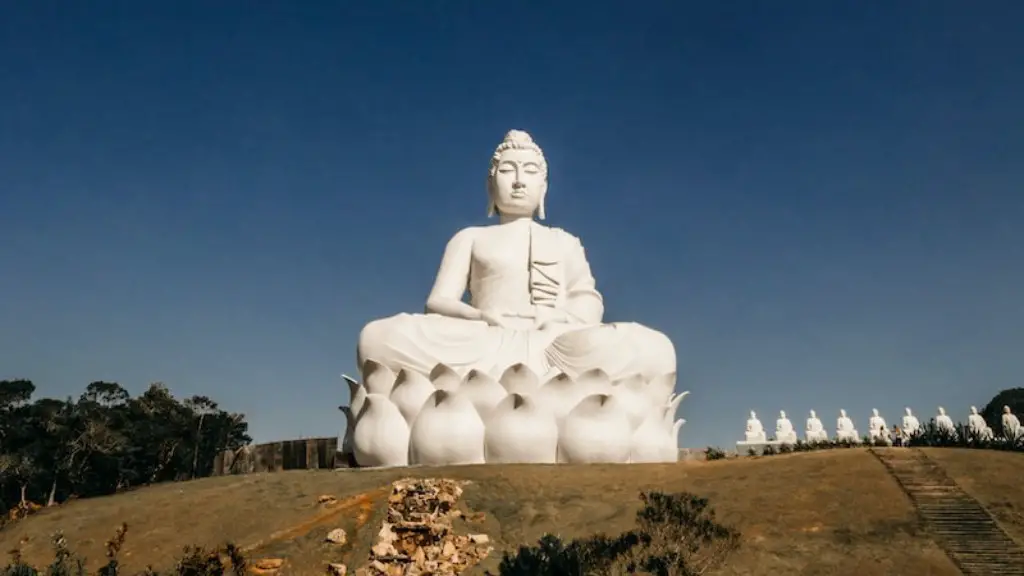Buddhism is a path of awakening that leads to liberation from suffering. In the West, Buddhism is often thought of as a religion, but it is actually a philosophy or set of teachings. The heart of the Buddhist path is the Four Noble Truths, which state that suffering is inherent in life, that the cause of suffering is attachment or craving, that suffering can be ended, and that there is a path to freedom from suffering. This path is called the Eightfold Path, and it includes practices such as meditation, ethical conduct, and wisdom.
In general, modern Buddhism is a movement that emphasizes personal spiritual development within the framework of an ethical life. This often includes an emphasis on social and environmental issues, as well as a more open, tolerant attitude towards other religions. Modern Buddhism also frequently includes elements from popular culture, such as mindfulness practices adapted from Eastern meditation traditions.
What is modern day Buddhism?
Buddhist modernism is a movement that began in the late 19th century as a response to the challenges posed by the modern world. It is characterized by an emphasis on reason and experience over tradition, on individual spiritual development over blind adherence to dogma, and on meditation and ethics over ritual and superstition. Buddhist modernists have also advocated for the increased participation of women and laypeople in the life of the sangha, and for a more egalitarian approach to the practice of Buddhism.
Buddhism is a religion and philosophy that originated in India in the 6th century BCE. The Buddha, Siddhartha Gautama, taught a Middle Way between sensual indulgence and the severe asceticism found in Hinduism and other Indian religions. He taught that people could escape the cycle of rebirth and suffering by following the Noble Eightfold Path.
Buddhism has grown to become a major world religion, with over 500 million followers. There are many different schools and traditions of Buddhism, but all Buddhists believe in the Four Noble Truths and the Eightfold Path.
Buddhism is not a religion that prescribes specific rules and regulations for its followers. However, there are some core values and practices that are central to the Buddhist way of life.
The Four Great Bodhisattva Vows are:
1) Work to end the suffering of others
2) Follow the Noble Eightfold Path
3) Cut Ties to Desire and Need
4) Lifelong Learning
The Five Precepts are:
1) Do not kill
2) Do not steal
3) Do not lie
4) Do not use drugs or alcohol
What are the three types of Buddhism
Theravada Buddhism, also known as Hinayana, is the oldest existing form of Buddhism. It is based on the teachings of the Buddha and is focused on achieving personal salvation. Theravada means “the way of the Elders” and is practiced mainly in Sri Lanka, Cambodia, Laos, and Thailand.
Mahayana Buddhism is based on the Mahayana sutras, which were written after the death of the Buddha. It is focused on helping others achieve salvation and is practiced mainly in China, Japan, Korea, and Vietnam.
Vajrayana Buddhism, also known as Tantric Buddhism, is the most recent form of Buddhism. It is based on the Vajrayana sutras, which were written in the 8th century. Vajrayana means “the Diamond Vehicle” and is practiced mainly in Tibet and Nepal.
There are inherent and fundamental differences between Buddhism and Christianity. Christianity is at its core monotheistic and relies on a God as a Creator, while Buddhism is generally non-theistic and rejects the notion of a Creator God. Buddhism also does not believe in divine values for the world, instead relying on personal enlightenment and morality.
What is the most popular form of Buddhism today?
The Mahāyāna tradition is one of the largest major traditions of Buddhism existing today. According to a survey from 2010, 53% of Buddhists belong to East Asian Mahāyāna and 6% to Vajrayāna. This compares to 36% for Theravada.
Buddhism teaches that drinking or using other kinds of drugs can cause carelessness and should be avoided. This is because when we are under the influence of drugs or alcohol, we are not in control of our own actions and thoughts. This can lead to us making careless decisions that we may regret later on. Strong Buddhist beliefs would therefore be expected to have a significant impact on alcohol use.
What are you not allowed to do as a Buddhist?
The precepts are commitments to abstain from killing living beings, stealing, sexual misconduct, lying and intoxication Within the Buddhist doctrine, they are meant to develop mind and character to make progress on the path to enlightenment. By following the precepts, Buddhists believe they can purify their minds, develop wisdom and eventually achieve nirvana.
The Five Precepts are guidelines to help us live a moral and peaceful life. By following these precepts, we can avoid causing harm to others and ourselves. The first precept is to refrain from taking life. This means not killing any living being, whether it is an animal or a human being. The second precept is to refrain from taking what is not given. This means not stealing from anyone. The third precept is to refrain from the misuse of the senses. This means not having too much sensual pleasure, such as watching television or eating unhealthy foods. The fourth precept is to refrain from wrong speech. This means speaking kindly and truthfully, and avoiding gossip and slander. The fifth precept is to refrain from intoxicants that cloud the mind. This means avoiding drugs and alcohol, which can make us forget our moral principles and act in ways that we would not normally act.
What are the 2 main beliefs of Buddhism
Buddha’s most important teachings are The Four Noble Truths, which are essential to understanding the religion. Buddhists believe in karma (the law of cause and effect) and reincarnation (the continuous cycle of rebirth). The Four Noble Truths are: (1) life is suffering; (2) suffering is caused by grasping and attachment; (3) suffering can be ended by letting go of grasping and attachment; and (4) the path to the end of suffering is the Eightfold Path.
The four noble truths are the foundation of Buddhism and state that existence is suffering, that suffering has a cause, that there is a way to end suffering, and that this way is through the practice of the Eightfold Path. These truths are meant to be taken as a whole, as each truth relies on the others to provide a complete understanding of reality and the human condition.
What type of Buddhism does the Dalai Lama follow?
The Dalai Lama is the spiritual head of the Gelugpa tradition of Tibetan Buddhism, which is the largest and most influential tradition in Tibet. The current Dalai Lama, Tenzin Gyatso, is the 14th Dalai Lama and has been in exile since 1959. The Gelugpa tradition is known for its emphasis on monastic discipline and study, and the Dalai Lama is a key figure in Tibetan Buddhism.
In Buddhism, actions have consequences, but there is no one who decides or punishes us for our actions. We ourselves create our own karma, and we experience the results of our actions in the form of rebirths. This is the law of cause and effect, and it is impersonal. There is no hell or heaven, merely different realms of existence that we may be reborn into depending on our karma.
Why do Buddhists not believe in god
Atheism is not an official doctrine of Buddhism or Jainism, but it is a position that is widely accepted by followers of both religions. The Buddha himself rejected the idea of a creator god, and Buddhist philosophers have even argued that belief in an eternal god is nothing but a distraction for humans seeking enlightenment. In Jainism, the idea of a creator god is also rejected, and Jain philosophers have traditionally been some of the most ardent critics of theistic religions.
The book raises the fascinating question: How could Jesus, living 500 years after Buddha and 3,000 miles away, embody teachings so similar in nature to his predecessor? Borg said some historians believe that Buddhist principles had filtered through the Roman Empire by the time of Jesus. In light of this, it’s interesting to consider how Jesus’ teachings may have been influenced by Buddhism.
What religion is most similar to Buddhism?
Both Buddhism and Hinduism teach a similar goal of liberation or spiritual enlightenment from the cycle of rebirths (samsara). In both traditions, the ultimate goal is to be freed from the cycle of death and rebirth, and to attain a state of nirvana or moksha. However, there are some important differences between the two traditions. For instance, Buddhism places more emphasis on personal effort and individual liberation, while Hinduism emphasizes the importance of social order and the role of God in liberation. Additionally, Buddhism teaches that nirvana is a state of complete detachment from the world, while Hinduism teaches that moksha is a state of union with God.
Buddhism has a special role to play in the modern world because the religion’s concept of independence accords closely with the fundamental notions of modern science. In an age where people are increasingly reliant on technology, the ability to think for oneself and make decisions independently is more important than ever. Buddhism’s emphasis on individual responsibility and freedom make it a perfect religion for the modern world.
What is the most popular type of Buddhism in the US
Some Asian scholars and Buddhists resent the focus on convert Buddhism in the United States One notes that Asian Buddhists have been in the US over five generations, and that the family-rooted religious practice is still the most popular form of Buddhism in the country. However, there is a growing trend of people who are interested in exploring Buddhism and who are not necessarily of Asian descent. While this may be seen as a positive development by some, others worry that the core values and traditions of Buddhism may be lost in the process.
The Buddha’s advice on married life is largely focused on helping couples to maintain a happy and harmonious relationship. He emphasised the importance of communication, mutual respect and trust, and working together as a team. The Buddha also advised against becoming overly attached to one’s spouse and warned against the dangers of infidelity. While the Buddha did not specifically condemn polygamy, he did advise against it as it can lead to conflict and disharmony. Ultimately, the Buddha emphasised that the decision of whether to be monogamous or polygamous lies with the individual, and that what is most important is that everyone is treated with love, respect and compassion.
Warp Up
Modern Buddhism is a movement that began in the late 19th century with the goal of bringing the teachings of the Buddha into the modern world. It has been influenced by Western philosophy and psychology, and has picked up various elements from other religions such as Hinduism and Tantra.
Modern Buddhism is a practice that is based on the belief in the Four Noble Truths and the Eightfold Path. This path is designed to help individuals achieve nirvana, or a state of enlightenment. Modern Buddhism is typically practiced in a temple or monastery, and followers of this practice typically meditate and chant as part of their religious rituals.




